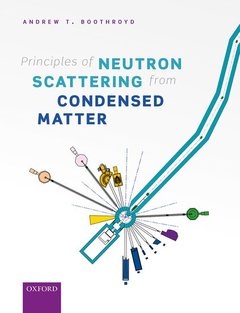Description
Principles of Neutron Scattering from Condensed Matter
Author: Boothroyd Andrew T.
Language: English
Subjects for Principles of Neutron Scattering from Condensed Matter:
Publication date: 07-2020
512 p. · 19.1x25.2 cm · Hardback
512 p. · 19.1x25.2 cm · Hardback
Description
/li>Biography
/li>
Neutron scattering is arguably the most powerful technique available for looking inside materials and seeing what the atoms are doing. This textbook provides a comprehensive and up-to-date account of the many different ways neutrons are being used to investigate the behaviour of atoms and molecules in bulk matter. It is written in a pedagogical style, and includes many examples and exercises. Every year, thousands of experiments are performed at neutron scattering facilities around the world, exploring phenomena in physics, chemistry, materials science, as well as in interdisciplinary areas such as biology, materials engineering, and cultural heritage. This book fulfils a need for a modern and pedagogical treatment of the principles behind the various different neutron techniques, in order to provide scientists with the essential formal tools to design their experiments and interpret the results. The book will be of particular interest to researchers using neutrons to study the atomic-scale structure and dynamics in crystalline solids, simple liquids and molecular fluids by diffraction techniques, including small-angle scattering and reflectometry, and by spectroscopic methods, ranging from conventional techniques for inelastic and quasielastic scattering to neutron spin-echo and Compton scattering. A comprehensive treatment of magnetic neutron scattering is given, including the many and diverse applications of polarized neutrons.
Andrew T. Boothroyd is a Professor of Physics at Oxford University, and a Fellow of Oriel College. After completing undergraduate and graduate degrees at the University of Cambridge, Andrew joined the University of Warwick, first as a postdoc and then as a University Lecturer. In 1991, he moved to Oxford University, where he has served as Head of Condensed Matter Physics, Associate Head of Department, and as vice-Provost of Oriel College. His research exploits neutron and x-ray scattering techniques to explore novel magnetic and superconducting materials. In 2011 he won the Institute of Physics Superconductivity Group Prize, and in 2017 he was recognised as an Outstanding Referee by the American Physical Society.
© 2024 LAVOISIER S.A.S.

